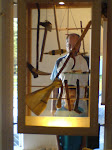 photo on the Swedish physician Christina Doctare.
photo on the Swedish physician Christina Doctare. photo on the Swedish psychologist Bodil Wennberg.
photo on the Swedish psychologist Bodil Wennberg. photo on the American neuorologist Jonathan H. Pincus.
photo on the American neuorologist Jonathan H. Pincus.The Swedish physician Christina Doctare (her homesite in
Swedish and in
English) wrote in her book
"Brain-stress" (a book I like and can recommend, but I think she has developed in a way I react against, becoming more cynical?) that she thought the future leaders in the world, on all levels I assume, need to have both IQ and EQ and proper broad-bands between these!! I think that metaphor is great! (I who had thought of fixing up here and practice piano, and now I am sitting writing again).
There are many things that make me think – and feel… Yesterday evening after I had watched the American series "Without a Trace" ("Brottskod försvunnen" in Swedish) I got stuck at the TV, and after this series it came another American (?) series "Out of Practice" (in English) about three men, a father I think and his two sons (I haven't seen it before at all, now just jumped into it). They were all about to date women, and discussed all their problems with this…
The father should now meet Crystal, but he felt a bit unsure about her. He had namely given her another name, Julie (the wife he had recently divorced from?) if I remember right, when they were about to get to sleep at another occasion, and of course that started a discussion between those two. This he mentioned to his two sons. And they joked about it. Laughing things away...
I felt more and more uncomfortable watching this.
The youngest son was “dating” his mother, which looked as a bigger sister…
I didn’t finish the watching, went to bed still feeling very uncomfortable… They joked about their shortcomings, and… It was no real warmth in this?? I couldn’t even laugh at it… Maybe I smiled, but it was a painful smile… As if people are merchandise… Masks, and not grown up really??
I wonder over phenomena in society, and react over them…
And even the series “Without a Trace” makes me feel uncomfortable many times too of some reason… It’s something creepy in it. And yesterday evening it was a bit more cruel than usual. A woman harming Jack Malone extremely cruel… Money was involved in the whole…
Jenson writes in her book that the healthier mentally the less you need power; you don’t need to exercise power, and not the power that money or material wealth gives either…
And the opposite Miller has written about; how much appreciation, money, power etc. a human being gets that is harmed, the hole will never be filled. Ever. Until he/she processes things. But it isn't especially likely the outermost harmed do (she means and many with her, Pincus too for instance, it can come to a point when an individual is so extremely harmed so it isn't possible, but then they must be very harmed?). Miller writes in “Paths of Life” that Hitler “didn’t stop in time”. He couldn’t get enough… And he was surrounded by a lot of "followers" and "Yes-sayers"...
Pincus also writes about “Hitler and Hatred”, here in English about this, and in Swedish (but he is not referring to Miller in his footnotes or references, so he is writing independently of Miller!!?? Or referring to Miller isn't "opportune" in many scientific circles??).
Thinking over empathy and its connections to intelligence… One (more or less) admires people who have high educations? Think they “know better”, are more trustworthy in a way, just because of their ability to think, imagine? For instance doctors are put high…
I also happened to read in Millers “Paths of Life” (the Swedish version) where she writes (in the chapter about how hate comes about, where it comes from and is "created" in her view, in the end of the book) about an interview in a newspaper with a German professor which was asked to express an opinion about the fact that most college-teachers after WWII had kept quiet about their connections to the Nazi-regime. The one that was asked had himself been a member of SS during his youth and even got distinctions (or honors) for what he did at the Eastern Front. He thought this silence was a sign of shame (shame in the meaning pudeur, blygsel in Swedish). Many events had been so horrible so it was best forget them and not speak about them. Yes, the best would be to forget them and not even try to understand them, not try to understand something that isn’t even possible to understand.
Miller writes that you can leave the question if it really was about shame or opportunism. To distance oneself from the past in this way is in Miller’s view highly problematic, because here is risk of repetition of pure ignorance (okunnighet in Swedish).
She thinks it is important that we try to understand how these horrible events could occur. Why so many intellectuals unreservedly (and openly and frankly) assented to (??) and supported the Nazis and why they refused to understand, to seek and honestly explore what happened to or befell them. Why it all happened to them.
I am thinking of politicians (not least Swedish, but also foreign, and even many ministers in our current government, which I don't like and didn't vote for) seem to be in total lack of feelings, emotions, empathy. Here you can really talk about empathy deficits I think in many of them (hasn't someone written about this: politicians and why they become politicians and not something else?). This probably also occurs among politicians in other parties, and both to the right and left…
Fundamentalism, orthodoxy… Secterism, gurus, father-figures… Are words that come for me (and I probably also have gurus?).
I am also thinking of something I read:
“The subject of Watson came up a few years ago when I was talking to some academics. They all murmured, 'Wonderful man, great man.' I said, 'No, he's not and you know it.' At once they agreed and a torrent [ström, störtflod in Swedish, a water tap that was opened?] of Watson horror stories emerged.”
And so it often is, the worse situations are, whether it’s about a work-place situation or in “higher” circumstances!? Noone dare to say (and many times not even see?) how things actually are?? People join "the praising choir"!?
Sounds like the Emperors new cloths! All are seeing that the Emperor is naked, but noone dare to say it, all join the game. And many even refuse to see the truth? They can’t even see it? Because it triggers something in their past?
Does this sound very hopeless and pessimistic?? What can one do? But it is as Naomi Klein says: "Information is Shock resistance"!!?? (I am, by the way, emotionally reacting at things around!).
Yes, there are mad and evil people in this world, and many of that sort in power-positions of all kinds!? Can they exercise their power even more than before? On a lager scale?
And this only "favors" the most egoistic in the current world (see about Ayn Rand, objectivism, egoism, altruism, and neoliberalism again)? Many resort to feelings of help- and powerlessness, and think it’s no idea to try to influence, or not even to go voting in elections. A vicious circle!?
But from where does these feelings of power- and helplessness stems? Triggered in the present situation, by what and how? (I wonder if these people are resorting to a psychological defence? What Bosch and Jenson calls the Primary Defence? Feeling power- and helpless without not actually being power- or helpless, even if this feeing feels very real, and even if they are convinced they have no influence or power at all. What Bosch and Jenson calls "the child's consciousness").
With amazement I watch what happens here where I live… I am thinking of a special politician (which is father of a former pupil, a girl that must be grown up now), his wife is psychologist… I can’t understand that he supports and actively joins what’s happening…
Yes, have politicians lost all contact with the grass-roots and being caught by a sort of mania (yes, can one in some cases even speak of megalomania I wonder with horror and amazement?)?? Are they entirely blind for what they are doing and the possible consequences of this? Giving power away it feels, by what they do. But by doing so they make sure that other parties won’t come back in power!!?? They will gain more themselves on this (or d they act self-destructively? And destructively too?? Is what they do beneficial for them either, or the possible results of their political decisions beneficial for them themselves or for anyone else, except for maybe a small minority?)? Solidarity – what’s that??
Yes, it’s true as it stands at the “front-page” of "Breaking Down Walls of Silence”:
“Till now, society has protected the adult and blamed the victim. It has been abetted in its blindness by theories, still in keeping with the pedagogical principles of our great-grandparents, according to which children are viewed as crafty creatures, dominated by wicked drives, who invent stories and attack their innocent parents or desire them sexually. In reality, children tend to blame themselves for their parents' cruelty and to absolve the parents, whom they invariably love, of all responsibility.
For some years now, it has been possible to prove, through new therapeutic methods, that repressed traumatic experiences of childhood are stored up in the body and, though unconscious, exert an influence even in adulthood. In addition, electronic testing of the fetus has revealed a fact previously unknown to most adults—that a child responds to and learns both tenderness and cruelty from the very beginning.
In the light of this new knowledge, even the most absurd behavior reveals its formerly hidden logic once the traumatic experiences of childhood need no longer remain shrouded in darkness.
Alice Miller
Our ordinary frame of reference for understanding the world should be ourselves. But if we don't have ourselves, don't have access to our feelings, we lose our personal frame of reference and then have to rely on outsiders, gurus, therapists, and so on. Until we have access, their judgement and perceptions become ours. They can download their ideas into our frontal cortex and their feelings into our limbic system. We lose the ability to see if what they say feels right because we have lost access to that limbic system. We then go by the words and not the feelings.
When we don't have access to our feelings, we tend to choose the wrong partner based only on their external behavior and not what lies underneath. We cannot sense nor see what people are really like. Words and behavior, the front, become all important. Arthur Janov”
And as Miller writes here (in Swedish) about reducing oneself to being a mask!!
About IQ and EQ. A site about EQ (in Swedish) and here Maslow’s hierarchy occurs again (I don’t really like the Swedish psychologist Bodil Wennberg). And see again what Bosch writes about Daniel Goleman and his EQ-concept (in English).
About Jonathan H. Pincus. Pincus on "The Crime of Non-Diagnosis" (I think psychiatric diseases comes, almost entirely, from mistreatment early in life, Pincus hasn't shaken off all poisonous pedagogy, but a lot, which is amazing though after such a long work in this field, he could change his mind to that degree as I get an impression he has).
Thinking about not having self-confidence or self-esteem... That it was taken from the small child once - and what are the results of this?? Can we imagine? Do we want to imagine?
Don't parents actually play perpetrators in hand?? Playing their own children in hands of perpetrators (if they don't make them perpetrators)?? Beating all self-confidence out of he child, treating it as it was noone and nothing...
And later, is it only to start liking oneself?? On the request and demand of others, because these others can't stand a person putting herself so low (they don't want to know why she is, because they have themselves experienced similar things, which is contempt for weakness)?




































